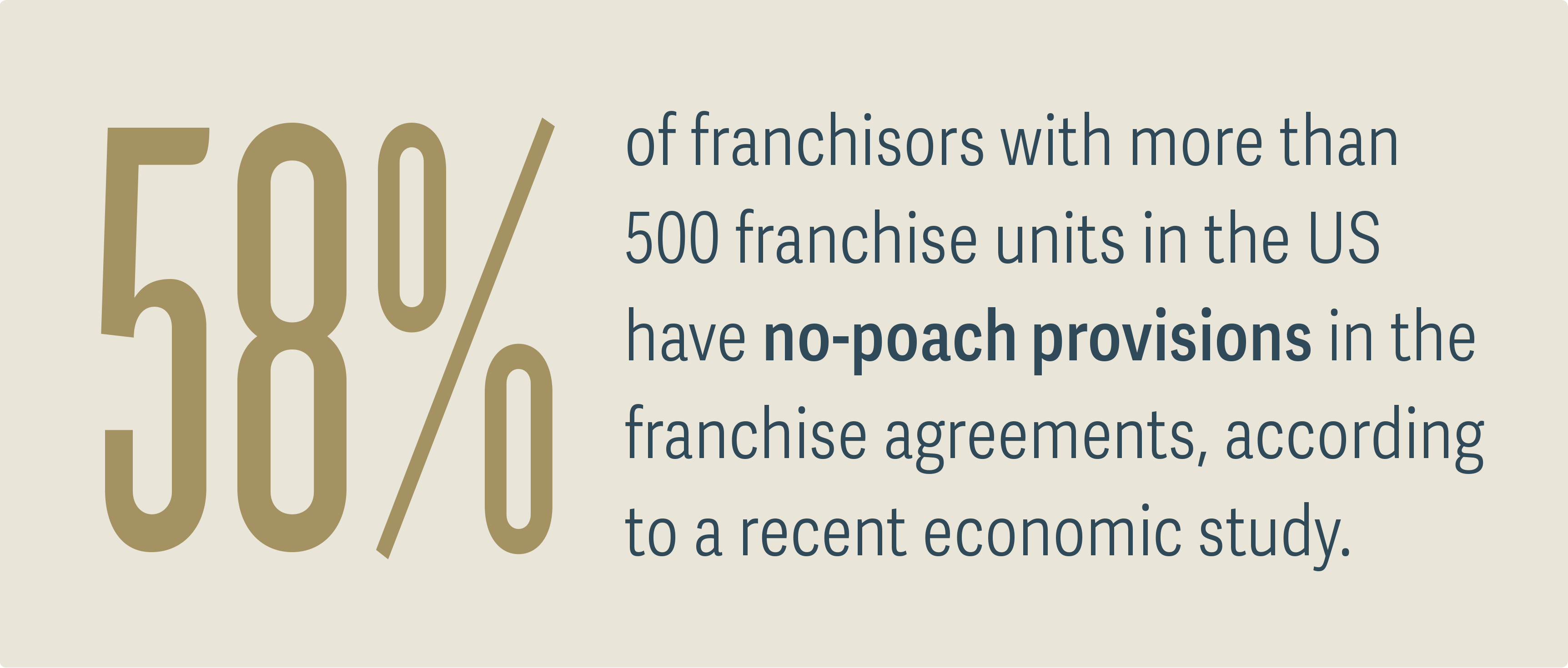-
Franchise No-Poach Agreements Face Antitrust Scrutiny
“No-poach” clauses in franchise agreements are common, but have drawn recent scrutiny from antitrust enforcers and plaintiffs.
Many franchise agreements contain clauses restricting franchisees from soliciting each other’s employees.
These “no-poach” agreements have attracted increased scrutiny from government enforcers and private plaintiffs following the 2016 issuance of the Antitrust Guidance for Human Resource Professionals by the US Department of Justice (DOJ) and Federal Trade Commission (FTC).
That guidance makes clear that “naked” no-poach agreements between competing employers, which are not reasonably necessary to legitimate collaborations, are illegal. In the franchise context, however, there is an ongoing debate whether no-poach agreements should be subject to a more nuanced “rule of reason” analysis that balances the potential harms and benefits of such restrictions.

Source: Theory and Evidence on Employer Collusion in the Franchise Sector, IZA Institute of Labor Economics (July 2018).
DOJ favors rule of reason
In March 2019, the DOJ filed a statement of interest in three no-poach class actions against fast food franchises. Citing the vertical relationship between the franchisor and the franchisee and the potential for both procompetitive and anticompetitive effects, the DOJ argued that rule of reason analysis is appropriate for evaluating most franchise no-poach agreements.
Two key antitrust issues
The main antitrust issues that must be considered in such an analysis are (1) whether franchisors and franchisees constitute a single economic entity, and (2) if not, whether there are potential procompetitive benefits from no-poach agreements in the franchise system.
The first issue requires evaluating both the business relationships within each franchise system and the alignment of economic interests between franchisor and franchisee. Important factors in this evaluation include the degree to which the franchisor exerts control over the franchisees in areas such as marketing, training, operations, and purchasing. Even given some alignment of economic interests, it is still necessary to assess whether the individual franchisees also have distinct hiring interests, and are therefore independent competitors in the labor market.
The second issue requires an analysis of whether no-poach agreements are reasonably necessary to the larger operations of the franchise system. No-poach agreements may incentivize employee training, increase retention, and decrease service disruptions – benefits which accrue to the franchise brand. However, this potential for increased inter-brand competition must be weighed against potential anticompetitive effects, including reduced wages.
In each case, rigorous economic analysis of the unique antitrust issues will be required to assess the balance of potential benefits and harms. ■
Jee-Yeon Lehmann, Managing Principal
Michael Schreck, Vice PresidentAdapted from “Recent Developments in Litigation and Regulation Related to No-Hire and Employee Non-Compete Agreements: Implications for Franchise Systems” by Aaron M. Fix, Jee-Yeon Lehmann, and Michael Schreck, Distribution: The Newsletter of the Distribution & Franchising Committee of the Section of Antitrust Law of the American Bar Association, Vol. 22, No. 1.
